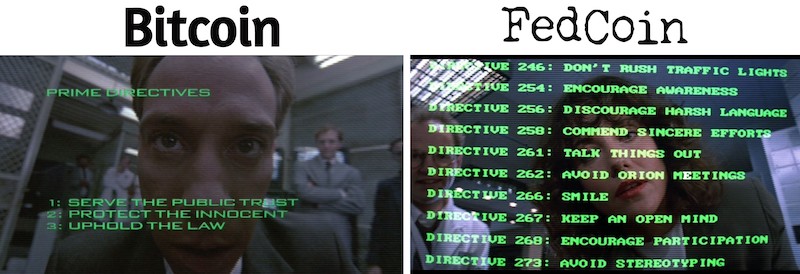
Cryptos are the antidote to repressive Central Bank Digital Currencies
Yesterday I wrote up why I don’t think any kind of China-style ban on Bitcoin and cryptos would be tenable in (so-called) liberal democracies here in the West. It referenced an earlier piece that described the threefold governance structure I see competing for relevance over the coming decades.
Somebody linked to those in the comments from a Tom Luongo piece (which I rather enjoyed enough to subscribe to his newsletter) but when I read through some of the other comments around Bitcoin, how it’s a globalist Trojan horse for surveillance capitalism and social credit I realized I needed to get a piece out to speak specifically to this aspect of future governance.
I cover this a lot in The Crypto Capitalist Letter, in fact it’s a pillar of our macro economic thesis (which you can download free here). It all comes down to the differences between real crypto currencies like Bitcoin, Ethereum, Dash, Monero, et al and coming Central Bank Digital Currencies (CBDCs), like China’s Digital Yuan, like the coming FedCoin, and anything else that will be issued by central banks, directly from governments or even in conjunction with Big Tech platforms.
There are the two main types of digital money that will co-exist in the future.
Each type of digital money corresponds to a governance mode of the future. Which type of this money you make your own or your business’ financial centre of gravity will have an outsized impact on whether you live in the future as a neo-Feudal serf or as a sovereign individual.
Each one has its own fundamental architecture, and the governance and economics that result from those architectures reflect the governance models of the mode that is built on them. This is critical and builds on what I’ve been writing about for years now, drawing on the work of relatively obscure commentators like Vincent Locascio and Steven Zarlenga. The latter who wrote in his Lost Science of Money, whoever controls the monetary system, controls society.
“a main arena of human struggle is over the monetary control of societies and that control has been and is now exercised through obscure theories about the nature of money. If it had to be summarized in one sentence, it is that by misdefining the nature of money, special interests have often been able to assume the control of society’s monetary system, and in turn, the society itself. ”.
It is because of how fundamentally the monetary architecture is reflected in the governance stack that sits atop of it that I can make the case with rather high confidence that Bitcoin and cryptos are not Trojan horses for globalist control. They are the opposite – they are the mechanisms through which people, all people, any person, the masses – can reclaim their own economic autonomy and become self-ruling and free.
The defining feature that makes them so is simply that a liberating crypto-currency is designed such that
- the blockchain is decentralized
- anybody can take part in validating the blockchain
- the possessor controls the private keys to the units he or she owns
This is Bitcoin. These are cryptos in general. They may also contain other features that confer a “sound money” status on them, like Bitcoin’s 21 million unit hard cap or Ethereum’s EIP 1559 protocol. But it is these three attributes, especially the last one, of holding one’s own private keys, that make them emancipatory monetary technologies.
The crypto folks have an expression: “Not your keys, not your coins”.
I expect this to be the defining feature that demarcates the difference between a bona fide crypto currency that empowers its holders and centralized digital cash (tokens) that governments and central banks run to control the populace.
Those skeptical of Bitcoin, who suspect a globalist, Davos-inspired regimen of surveillance and social credit are correct about digital cash being the conduit for those, but they’ve simply conflated all forms of digital money and view Bitcoin as typical or a test-run of them.
This misconception arises simply from not knowing or understanding the differentiators between a crypto like Bitcoin and a Central Bank Digital Currency (CBDC), like a coming “FedCoin”.
CBDCs will very much be tools of elitists to implement top-down command-and-control economics and even Great Reset-style social management through monetary policy.
CBDCs will in all likelihood not be designed to put the private keys over the currency units into the hands of its possessor.
Digital “cash” under CBDCs will be centrally programmable and implemented without end-user consent across all national governance and Davos-inspired initiatives.
CBDCs will be the rails of all manner of economic programs (like UBI and MMT) and social policy objectives which simply are not possible, or desirable under cryptos:
- Expiry dates on “cash” in your wallet
- Negative interest rates if you try to save any of it
- Social credit objectives (no jab / no stimmie)
- Instant taxation on transactions and payments
- Social justice pricing (cup of coffee costs 10X if you’re in a higher tax bracket)
- Built-in climate tariffs
- Capital controls
- Infinitely inflatable, issue on demand
If you thought the Federal Reserve was suffering from mission creep now that they’ve decided to tackle climate change and social justice, just wait until they get the ability to program what you can do with the money that’s already in your wallet.

That is what we’re looking at with CBDCs and if that’s your dystopian vision of what digital cash means, you’re not wrong. You’re just misdirecting your apprehensions if you think that’s what Bitcoin means. This is because it and most of the other digital currencies are the antidote to CBDCs. Which is why they are subject to such hostility from policy makers, the corporate press and elites.
This will be a battle. A never-ending tension between these two digital money systems – crypto currencies, which are actually fungible, inelastic, deflationary (purchasing power increases over time) and which gives their holders economic autonomy in this new era.
On the other side we’ll have these centrally issued, programmable digital tokens.
Which side of the ledger the majority of your economic activity happens on will govern your future status as a Neo-Serf or an autonomous Sovereign Individual. If the dynamic becomes extreme it could even result in a kind of monetary Apartheid.
The good news is that today, at this moment in time, it’s still largely self-selecting.
I’ve written many times, that crypto’s (real cryptos, not CBDCs or even stablecoins) are all about optionality. Crypto’s like Bitcoin confer options on their holders (HODL-ers), while the coming CBDCs will be all about limiting them.
I cover this dynamic extensively in The Crypto Capitalist Letter, a long with a tactical focus on publicly traded crypto stocks. Get the overall investment / macro thesis free when you subscribe to the Bombthrower mailing list, or try the premium service for a month with our fully refundable trial offer.


Great article.
Cryptopunk
Hi Mark, thanks for the clarification.
You did a good job laying out criteria for which crypto's really matter. However, you may want to take a closer look at Ethereum's centralization. Its difficult for regular folks to run full validating nodes on Ethereum. Additionally, the MEV issue that pits miners and stakers against users, and pits the "ETH store of value" narrative against the ETH as a utility token for a smart contracting platform.
I found Stephan Livera recent podcast helpful in understanding the ETH ecosystem's centralizing tendancy: Ethereum’s Path to Centralisation with Alex B https://anchor.fm/stephan-livera/episodes/SLP303-Ethereums-Path-to-Centralisation-with-Alex-B-e16nhag
Could you comment on why the correlation between BTC and S&P 500?
Thanks
Everything is correlated because the central banks are destroying the currencies.
I still don't understand how prices on goods will develop? How do I know whether the price for a specific good is appropriate? And where are the places I can pay with Bitcoin?
Best regards
Marcel
All the widespread theft of crypto from exchanges leaves a prudent person wary of it. Many of these so-called "hacks" are oviously just a ruse in which the proncipals are flagrantly stealing the money on the exchange. At present, there is no way to safeguard against this, so crypto will remain a fronge phenomenon.
Your ignorance disqualifies you from opining. The entire point of crypto is self custody.
Always move your crypto off the exchanges.
I know what you are supposed to do, but if everybody knows this, why is there so much money waiting on the exchanges to be stolen?
Thank you again for your excellent articulation of the difference between crypto and Bitcoin, and your assessment of the crypto landscape.
> The crypto folks have an expression: “Not your keys, not your coins”.
That is one part of the trio.
1. Not your keys, not your coins.
2. Not your node, not your rules.
3. Not your miner, not your network
The second is a reminder if you don't have a node, you have to trust someone else's. And that you need to reveal your interests when inquiring about addresses.
The third line is poorly developed but is intended to encourage every Hodlr to mine, preferably on their own premises. Mining, which has become a riskily large and identifiable activity, needs to return to its place in the Whitepaper. That is, each user does it, possibly for profit, but at least for decentralised resilience and protection of a network they use. If a proportion of the 300M mined, even at the 400w level, it would amount to a long tail that would keep the dog on the straight and narrow.
Stumbled over this mis-titled adoration of the central bank, the technocrats who'll save us all, that I think is pertinent to your comments:
“The People’s Ledger: How to Democratize Money and Finance the Economy”
"the Article outlines a series of structural reforms that would radically redefine the role of a central bank as the ultimate public platform for generating, modulating, and allocating financial resources in a democratic economy—the People’s Ledger."
https://bit.ly/3ueEHyg
Democratic? They're unelected independent political appointments…
The author "advocates a comprehensive qualitative restructuring of the Fed’s investment portfolio, which would maximize its capacity to channel credit to productive uses in the nation’s economy."
Productive uses, in whose opinion?
If Bitcoin is all about Classic Jeffersonian Freedom, why did the Satoshi guy mine several million for himself before ever "releasing it into the wild"?Rumours of Deep State Alphabet – and bankster bloodline – ties also swirl around the invention/inventors of "cryptos." Can you answer me and counter those points without a perfunctory dismissive arm-wave and the epithet of TROLL!
Half of me thinks they're a great idea. The other half thinks they're friggin' tulip bulbs, Internet style.
There was never any Bitcoin premine. Satoshi mined BTC like everybody else did, after the protocol was disclosed and the network launched. My guess is whoever Satoshi was, took part in the early dev talk (via the cypherpunks list), mined and contributed to the network like all early adapters, and then hit some point where he decided to step away.
In my mind the discipline and the humility to remain anonymous and leave the accumulated Satoshi stack untouched is almost other-worldly.
I wanted to ask about one sneaky little detail you didn't mention. Being that Bitcoin (and most other cryptos) are on public blockchains, it is too easy to figure out who is sending what to whom. Companies like ChainAlysis already know to whom the vast majority of Bitcoin addresses belong. It's too easy. When someone buys BTC on an exchange, and immediately sends it to a private wallet, it's a safe bet they're sending it to themselves to store it offline. Thanks to Coinbase (and others) turning over their user's data, something like 80% of BTC addresses are already known. No privacy = no freedom, even if the coin is deflationary, decentralized, and you own your private keys. What good is it having control over your money, if every time you spend it, the transaction becomes public record of exactly: when, how much, and to whom you sent it?
I think you’ll certainly get that level of granularity in CBDCs, but that’s not what “public blockchain” means for Bitcoin. It may not be anonymous but it’s pseudonymous enough. The exchanges will always be the chokepoints, but those aren’t the only places where you earn bitcoin.
The other thing is I don’t really care about anonymity in the following sense: I just want complete control over my wealth, regardless of what anybody says about what I do with it. So maybe people could “see” where I’m moving capital to. They can’t do anything about it.